



Conflict Phase
Each of the Ideologies begins the game neutral toward the other Ideologies. This means that each player can engage the other players in either Cultural or Economic Conflicts (not Military Conflicts).
In the hope of securing control of Central Asia, the Imperialist player declares a Cultural Conflict there against the Islamic Fundamentalist player. Because the Imperialist player's "Global Colonization" ability does not help him during the Conflict Phase, the Imperialist player must first discard a Cultural Influence card from his hand to pay for his distance penalty. He then places another Cultural Influence card from his hand beside Central Asia.
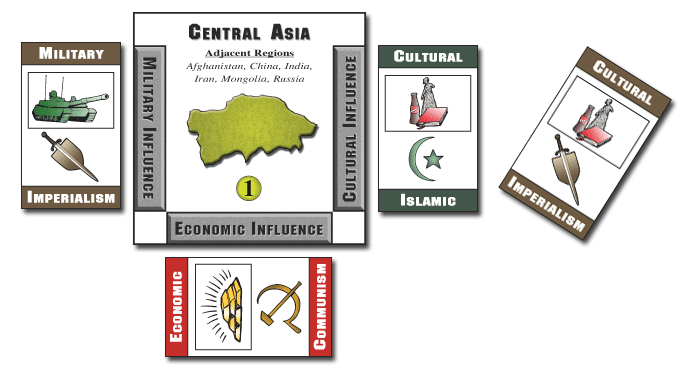
The Islamic Fundamentalist player plays a Cultural Influence card from his hand to deflect the Imperialist player. Both the aggressor's card and the defender's card are discarded. Note that the defender never needs to pay a distance penalty or an Advancement penalty. Even if Central Asia were not adjacent to Iran, the Islamic Fundamentalist player would not have to pay a distance penalty to defend himself in Central Asia.
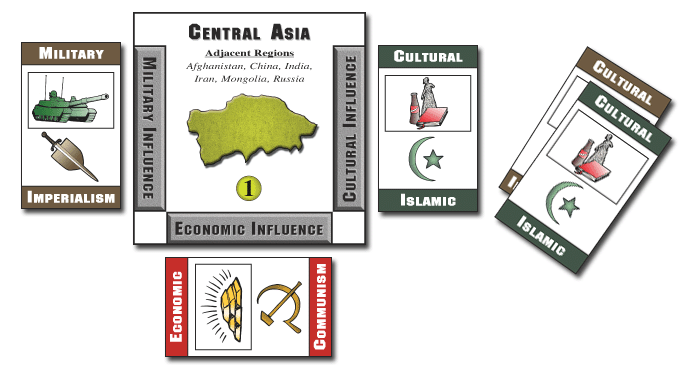
The Imperialist player is now out of cards, so he cannot continue the Conflict. He must therefore end his action. Once again, both the Capitalist player and the Fascist player must pass during this phase because they have no cards left in hand. The Communist player sees that the Islamic Fundamentalist player only has one card left in his hand. The Communist player therefore initiates a Cultural Conflict in Central Asia against the Islamic Fundamentalist player. Because Russia is adjacent to Central Asia, the Communist player does not have to pay a distance penalty before placing his Cultural Influence card beside Central Asia.
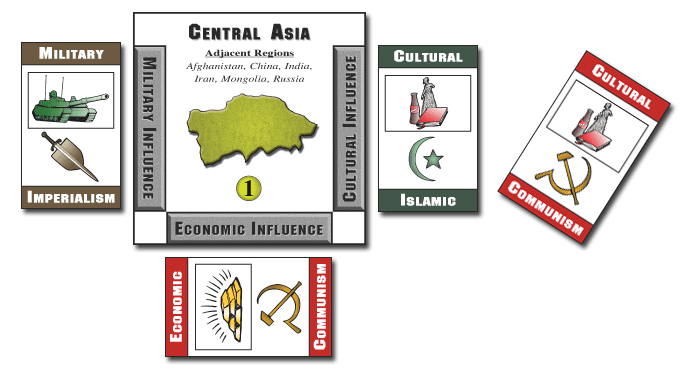
The Islamic Fundamentalist player has yet another Cultural Influence card in his hand, which he uses to deflect the Communist player's card (once again, both cards are discarded). Had the Islamic Fundamentalist player had another type of Influence card left, he would not have been able to deflect the Communist player's Cultural Influence card. The defender always needs to use the same type of Influence card to deflect the aggressor's Influence card.
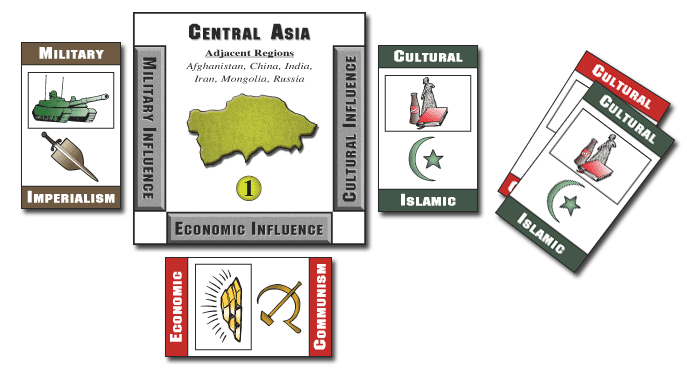
The Communist Player has one Cultural Influence card left in his hand, so he decides to continue the Conflist by playing it beside Central Asia. Note that because the Islamic Fundamentalist player deflected the first attack, the Communist player is continuing the same Conflict (which is therefore part of the same action). Had the Communist player succeeded with his previous attack, then he would have had to end his action and allow the next player to proceed.

This time the Islamic Fundamentalist player is out of cards, so the attack succeeds. The Islamic Fundamentalist player's Cultural Influence card at Central Asia is replaced by the Communist player's successful Cultural Influence card. The replaced Islamic Fundamentalist card is discarded, and the Communist player's action ends. If the Communist player wants to initiate another Conflict this turn, he will have to wait until after the other players have a chance to act or pass.
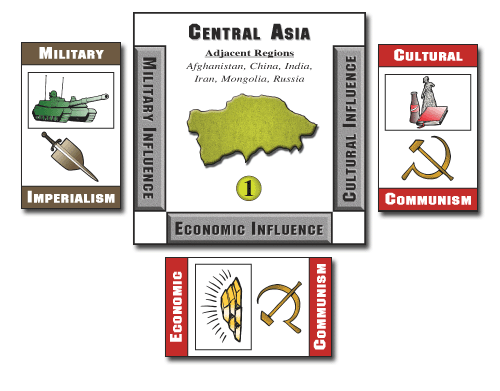
The Islamic Fundamentalist player is out of cards, so he must pass during this phase. The action again returns to the Imperialist player, who is also out of cards. The Imperialist player no longer has the opportunity to remove his Military Influence card from Central Asia this turn, because removing one's own Influence from Independent or Opposing Regions is only done during the Foreign Phase. The Imperialist player therefore passes, as do all the other players because no one has any cards left. The Conflict Phase therefore ends.
Note that if someone had wanted to replace the Imperialist player's Military Influence card at Central Asia, they would not have been able to do so this turn because none of the Ideologies were at war with one another. Declaring war is only done during the Diplomacy Phase (which takes place after the Conflict Phase), so a player always has a chance to prepare himself for Military Conflict after war is declared against him. The Islamic Fundamentalist player's "Jihad" ability actually allows him to declare war during the Conflict Phase, although this ability is expensive to use (he must discard a Military Influence card from his hand in order to activate this ability).